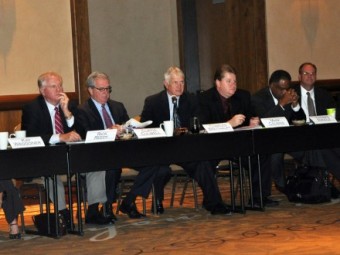Legislative Council Set to Meet in October
By Julianne Coyne | Thursday, September 23, 2010 1:33 PM

Members of the Legislative Council, UIL Executive Director Charles Breithaupt and Policy Director Mark Cousins listen to speakers at the 2009 October meeting. Photo by Jeanne Acton
Each October, superintendents from around the state arrive in Austin for the Legislative Council meeting where they decide University Interscholastic League rule changes.
The year, the Legislative Council meeting will address proposals regarding reclassification and realignment, athletics, music and academics. The Council will meet Oct. 17-18 at Hilton Hotel in downtown Austin.
“The meeting will hopefully be pretty quiet this year,” Policy Director Mark Cousins said. “It doesn’t appear at this point that many contentious rules are up for discussion.”
Reclassification and Realignment
The Ad Hoc Committee on Reclassification and Realignment is recommending seven possible changes.
One of the proposed changes is to increase transparency by releasing selections made by schools, such as whether they play six-man or 11-man football or if they chose to “opt up.’”
Two proposed changes have to do with enrollment numbers, considering whether students with multiple disabilities and students who attend alternative schools should be subtracted from a school’s total enrollment figures.
The R&R committee also recommended splitting 1A into two conferences. Division 2 basketball and six-man football would become 1A and Division 1 basketball and 11-man football would become 2A. If passed, all of the other conferences would move up one conference. For example 2A would become 3A and so on.
Athletics
One proposal heading to the council is to alter the first scrimmage date for soccer from after winter break to before or during the break. Another proposal for soccer would create a conference for 3A schools.
In baseball and softball, a proposed rule change would allow teams to substitute three games for a tournament instead of the current two.
Academics
The Legislative Council will consider the rules for a pilot chess puzzle contest for grades 2-8 through the A+ Academics program.
Susan Polgar, a chess grand master and founder of the Susan Polgar Institute of Chess Excellence at Texas Tech approached UIL in 2009 to create a chess puzzle contest within UIL.
The contest is a set of puzzles, and the objective of each puzzle is to get to checkmate.
“Chess can teach many of valuable skills for kids such as analytical thinking and pattern recognition,” A+ Director David Trussell said.
According to Trussell, if the Legislative Council approves the proposal, the pilot may be offered to a limited number of districts this spring and will be offered to every A+ district that wants to participate by fall 2011.
Another academic proposal, if passed, will institute a verification period in the four journalism contests to guarantee the correct student gets credit for his or her work.
“If approved, the verification period will increase accuracy in results,” Journalism Director Jeanne Acton said. “It will not give coaches the right to question judging decisions. The verification is for identification only.”
Acton said the state office is encouraging district and regional sites to start the verification periods this year.
“We will be doing it at the State Meet this year,” she said.
In One Act Play, two rules are up for consideration. One rule limits the number of sessions students can attend at festivals to four and the number of days of school students can miss for One Act Play festivals to three. The other proposed rule would utilize a panel judging system for contests at the regional and state levels. The rule change would allow critiques when a panel of judges is used.
“In order to get the most educational value out of panel judging, this rule will let us provide oral critiques,” Theatre Director Luis Muñoz said. “We’re going to continue to have high standards and focus on education.”
Music
Music has four proposals coming before the Legislative Council.
One of the proposed changes is to add a three-minute study period for the band or orchestra director in the sight-reading contest.
According to the proposal, this study period “would afford the director an opportunity to quickly develop a ‘lesson plan’ that would guide him/her through the instruction segment of the sight-reading process.”
Other proposals include the prohibition of recording devices in the sight-reading room, stipulations that would close the vocal sight-reading music during warm-up and a requirement that orchestra and band sight-reading music be turned face down during warm-up.







